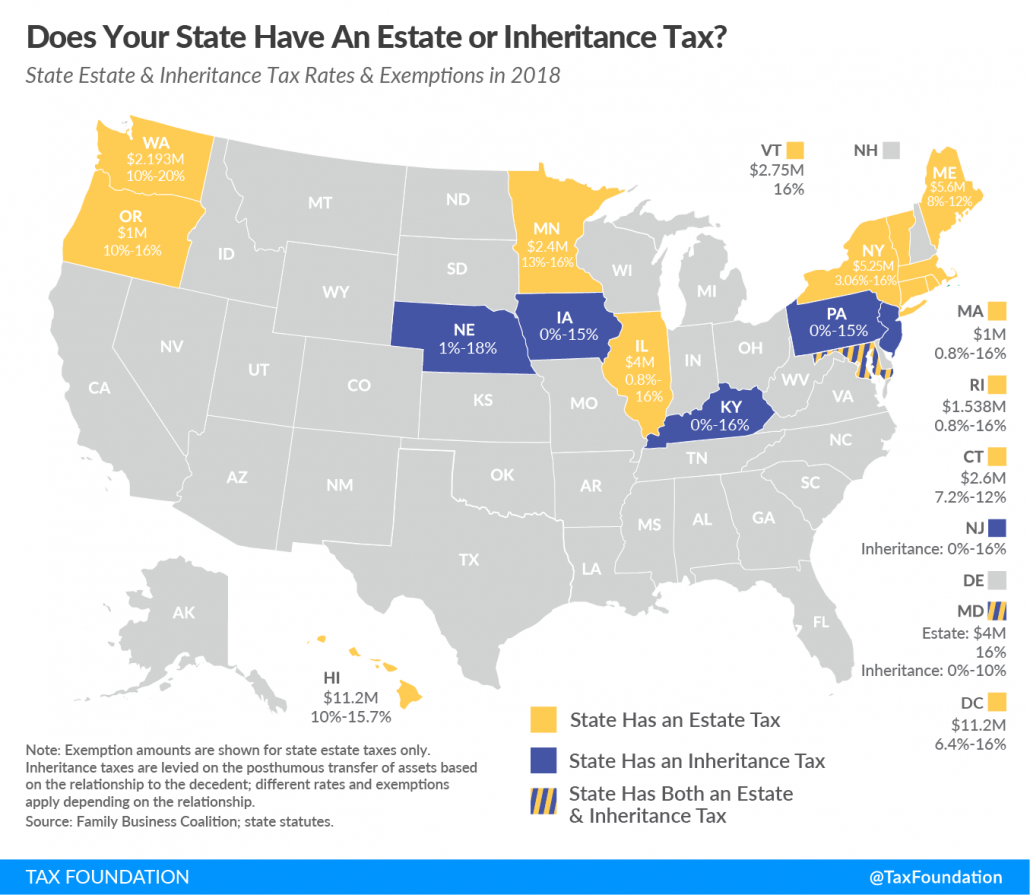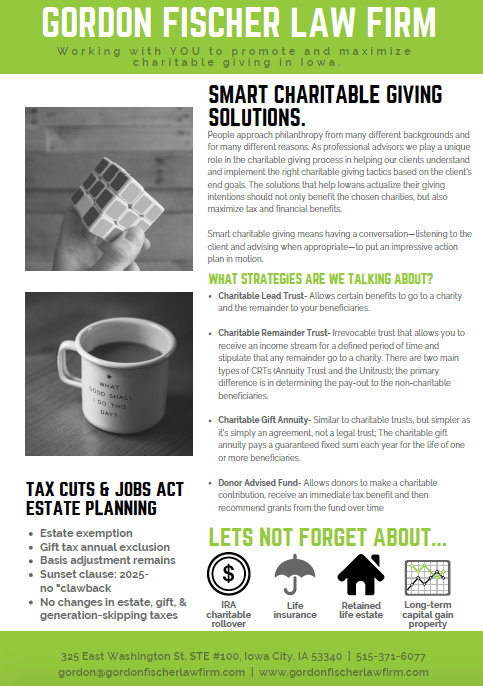Changes to the tax code can and often do impact estate planning because one of the major goals for most is to reduce or eliminate the taxable amount of the estate. Passed at the tail end of 2017, the Tax Cuts and Jobs Act (otherwise referenced as the new tax law), is no different and there were some major changes that will no doubt impact estate plans moving forward. What did the Act change, what didn’t it affect, and what should you do to maximize your benefits?
Estate Exemption

One of the most significant changes under the new tax law are the estate-related exemption amounts. The estate tax exemption—or estate tax exclusion as it’s sometimes referred to—is the figure subtracted from an estate’s gross value for the purpose of calculating federal taxes.
This change is one that all estate planning individuals, especially those classified as middle- to high-net worth, need to be aware of. For tax years 2018 through 2025, the exemption from estate, gift, and generation-skipping taxes was raised from $5.49 million per individuals to an approximated $11.2 million. (The exemption base is indexed, so the base for the 2017 tax year was $5 million; for the 2018 tax year, the base is now $10 million and still indexed for inflation.) This means each individual should be able to shelter over $11 million before any estate, gift, and generation-skipping taxes apply.
If you’re married, this means your estate exemption for tax year 2018 now equals $22.4 million. (Or, you could think of it like each couple now has an additional $11.2 million in assets available to gift or make a testamentary transfer with.)
Important Considerations
Other estate planning related taxes

None of the estate, gift, or generation-skipping taxes were repealed by the new tax law, and the tax rates for these remains at 40 percent. Just for review: the federal estate tax is applied to the transfer of property at death; the gift tax applies to transfers made while living; and, the generation-skipping transfer tax is applied to transfers of property that skip a generation.
However, these transfer taxes (sometimes referred to as excise taxes) will apply to fewer estates given the major increase to the exemption figures. (The Joint Committee on Taxation estimates the number of taxable estates will drop to 1,800 in 2018, compared with 5,000 estates under the previous tax law.)
Gift tax annual exclusion
Discussing gift tax can be confusing when you consider there is an annual exclusion amount and a lifetime gift tax exemption. Let’s clarify some important points, so you can feel great about gifting to your loved ones!
In the 2018 tax year, the annual gift tax exclusion will be $15,000. This is up from the $14,000 it’s been stuck at for the past half-decade. This annual gift tax exemption is inflation-based, but only raises in increments of $1,000, which is why it took the rate five years to increase.
This means you could gift up to $15,000 to an individual without cutting into the lifetime gift tax exemption. You can give gifts up to that value to multiple individuals. Meaning if you have three adult children and want to gift each of them $15,000 in the 2018 tax year, you could do so and it would be completely exempt from the gift tax. If you’re married (and your spouse consents) you can give a joint gift (otherwise referred to as a split gift) of up to $30,000 per individual in the 2018 tax year.
Let’s say you, as an individual, want to gift a grandchild $20,000. That $20,000 is $5,000 greater than the annual gift tax exclusions and that $5,000 would then be counted toward the lifetime exemption rate (the $11.2 million previously discussed).
Timing

Because the new exemption rates are only instated (as of right now) through the 2025 tax year, on January 1, 2026 the exemption basis will revert back to where it was for the 2017 tax year—$5 million exemption per individual. (Of course, the actual figure will be larger because it will still be indexed for inflation.) Congress could choose to extend this exemption rate past 2025, but they could also choose not to. There could also be further changes to the tax law after future congressional and the presidential elections.
Basis adjustment
There was no change made to the step-up in basis rules. Meaning, when you pass, assets left to beneficiaries are reset to the fair market value at the date of your death. This is a benefit when it comes to taxes for both the whomever inherits the property and helps simplify taxes because there’s no guesswork as to what the property was worth when the testator (the person who made the estate plan) acquired it.
Actions to Take Today
If/when the exemption amounts are reduced, there will be no “clawback,” allowed, meaning that gifts and transfers made up until 2025 will not be later subjected to taxes. That means if the increased exemption rate could have an impact on your estate and allows you to make gifts increased in quantity or value, time is of the essence. Where to start?

Research & consult on your options
There are a few different approaches to gift-giving that could be particularly fitting with the tax changes. Look into establishing and funding a new irrevocable trust or gifting to an existing one. Contemplate how gifts could be applied toward life insurance funding or present sales to trusts. For the charitable-minded individual, the higher exemption amount represents an opportunity for increased philanthropy—consider a tool like a charitable lead trust.
Discuss your options with the appropriate professionals such as your estate planning attorney, financial advisor, and accountant. They’ll be able to advise on tools and strategies you’ve researched, but also provide clear information and counsel of options you didn’t even know about. It’s your professional advisors’ jobs to present you with all the info (benefits and potential detriments) you need to know to make an informed executive decision regarding your estate.
Review estate plan
You should review your estate plan annually regardless of any legislative changes, but with the new tax law you’ll certainly want to review your will, any trust documents, estate planning goals, and overall tax strategies. Again, discuss your options with a qualified estate planner!
Contact me for a free consult
Let’s talk about what the new tax laws mean for you, your family, and your legacy. How can you leverage the increased exemption rate to make a difference in your community? How can you better prepare your heirs when you’re not around to support them and offer guidance? Contact me for a free consultation via email or by phone (515-371-6077).














